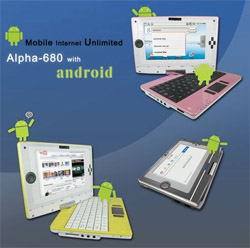Will ARM netbooks be competitive?

Rumors of netbooks using smartphone components rather than Intel chips and Microsoft Windows are nothing new. But we're finally getting a good idea of just what a PC based on an ARM processor and Linux will look like.
Because the tiny ARM chips are designed for smartphones, many believe that netbooks using them will be less expensive and get better battery life than those using Intel's Atom processor. ARM itself has said that netbooks using its technology will cost $200 and last eight to 12 hours on a charge (ARM: Heretic in the church of Intel, Moore's Law). But it's not clear that the first ARM netbooks--six to 10 models this year, according to ARM--will reach these lofty goals.

Even by netbook standards, the Alpha 680 looks under-powered. It is based on a 7-inch display with a resolution of 800 by 480 pixels, even as most netbooks are moving to 10-inch, 1024-by-576 displays (several are now offering 1366x768 displays as well). It will have 128MB of memory (expandable to 256MB) and a 1GB SSD (also expandable, to 4GB). Even with this low-end configuration, the Alpha 680 will start around $250. That's less than any 10-inch netbook, of course. But you can pick up the Dell Inspiron Mini 9 with an 8.9-inch LED-backlit display (1,024x600), 1.6GHz Intel Atom N270, 1GB of memory, 4GB SSD and Ubuntu Linux for $279.
As for battery life, Skytone says the Alpha 680 with its two-cell battery will get two to four hours on a charge. By comparison, the Mini 9 with its standard four-cell battery lasted 3 hours 21 minutes on CNET's tests.
To keep the price down, the Alpha 680 won't come with many applications. You can use Web-based applications or download apps from the Android Store, though Wu told Networkworld that some 20% of apps in the store won't work because of compatibility issues. Uh-oh. There's a reason why more than 90 percent of netbook buyers have chosen a $15 copy of Windows XP over a free Linux distribution.
Comparing the Alpha 680 with current netbooks misses the point, Wu told Networkworld. Netbooks have actually become too powerful, he said, and what the rest of the world really needs is a very low-cost mobile device for checking e-mail, browsing the Web and performing basic chores. That may be true, but ARM-based netbooks will still need to be competitive in terms of specs, performance and price to knock Wintel off its perch.
The Alpha 680 will be smaller and lighter than other netbooks--no surprise given its specs. Skytone says it will weigh 1.5 pounds and measure 8.5 by 6 by 1.2 inches. But so far that approach hasn't worked woo well either with early netbooks using 7-inch displays or with MIDs (Mobile Internet Devices). Ultimately the question is whether there really is a market for a device that is neither smartphone nor notebook.